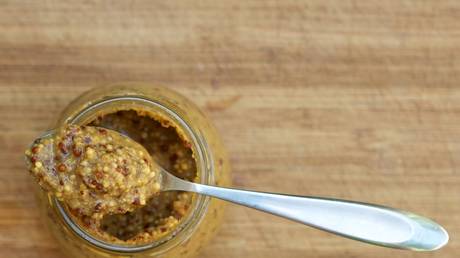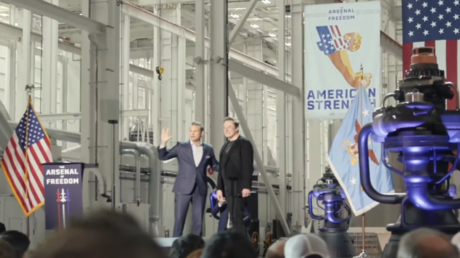
Commenters were shocked when the museum allegedly removed Russian mustards from its shelves
Midwestern mustard aficionados hoping to see some rare Russian condiments are out of luck, as the National Mustard Museum in Middleton, Wisconsin is apparently no longer exhibiting Russian mustards. According to a photo circulating online, the museum will only return the spicy dressings once Russia “recognizes and respects the sovereign nation of Ukraine.”
“The Russian mustards have been temporarily removed. They will return once the invasion of Ukraine is over and Russia recognizes and respects the sovereign nation of Ukraine,” read a sign apparently seen at the museum, and posted online on Sunday.
An empty display area can be seen behind the sign, where the Russian mustards presumably previously stood. The museum has not commented publicly or confirmed the decision on social media.
Russian forces entered Ukraine in late February, in a large-scale military operation that Russian President Vladimir Putin said is aimed at neutralizing and “denazifying” the country. Russian forces have steadily taken large swathes of Ukrainian territory, and several rounds of peace talks aimed at resolving the conflict have thus far failed to deliver results.
The museum’s move was roundly mocked online. Commenters sarcastically quipped that this, and not banking bans and energy embargos, would be the sanction that finally topples Russian President Vladimir Putin from power.
Others were more surprised that the National Mustard Museum exists in the first place (It’s both a store and a museum, and was opened in 1992 by the assistant attorney general of Wisconsin, who quit his job as a prosecutor to amass a collection of more than 6,000 mustards from 70 countries around the world).
The removal of Russian mustards brings to mind the ‘Freedom Fries’ debacle of 2003, in which some American restaurants – and even three cafeterias at the House of Representatives on Capitol Hill – renamed ‘French Fries’ as ‘Freedom Fries’ to protest France’s unwillingness to participate in the invasion of Iraq.
“I’m old enough to remember ‘Freedom Fries’, and how there was a near-consensus among everyone of all political stripes except the dullest right-wing goons that it was f*****g silly,” one commenter wrote “Now everyone is like that.”
Yet Russian mustards aren’t the only victim of the current wave of anti-Russian sentiment sweeping the West. Concert halls have canceled performances of Tchaikovsky’s music and banned Russian performers, Restaurants in Europe have allegedly refused to serve Russian patrons, and the International Cat Federation has banned Russian-bred and Russian-owned cats from its exhibitions.
Severe economic penalties have also been levied on Moscow by the governments of the EU and US, while scores of private companies have voluntarily cut off all business with Russia.




